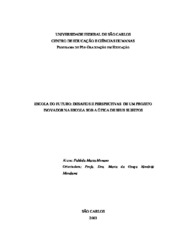Escola do futuro: desafios e perspectivas de um projeto inovador da escola sob a ótica de seus sujeitos.
Abstract
In the current context of intense technological and paradigmatic
transformations within the many institutions of the societies, the School of the
Future Project (SFP) was conceived and materialized in municipal schools of
Basic Education having in its scope the ideal of an inclusive and
"technologically-up-to-date" education tailored for the demand of its community.
In view of recent contributions of scientific literature in the educational domain
regarding the centrality of the educator in the formative process, considering
also its subjectivity in association with the available objective conditions (such
as didactic resources, institutional culture etc.), this work aims at the
perspectives of projects such the above mentioned one and is focused on
answering to the question: "what conceptions, yearnings and expectations are
present, under the optics of its individuals, in schools that are in the imminentcy
of the implantation of technological innovation projects ?" Having as its main
data source the reports "collected by means of half-structuralized interviews"
directed to the individuals more directly involved in the SFP, the results show
differences on the individual s degrees of involvement, which are in proportional
relation to the institutional hierarchic thereby highlighting the importance of
"(re)thinking" about the school structure while a community that teaches and
that learns. Also it as verified the concurrency between the new challenges
considered for the innovative project and the old difficulties that characterize the
school (fragmentation and overload of both the functional and the organizational
structure of the school) what it seems to be aggravated by the vision of the
different individuals regarding the historically instituted relations between the
school's internal and external instances (understanding these last ones as the
educational agencies and politics). Moreover, some "veteran questions" of the
educational universe seem to re-emerge driven by the feeling of instability
generated by a technological innovation project within the school, namely: the
relation school/family/community, curricular election and contents teaching,
skills and professional development of the educator, discourses and reductionist
practices of the pedagogical act. Concluding, we consider the importance of the
school in the transformation vertex intended for a faired and more humanized
society, and also propose some perspectives so that initiatives such as the School
of the Future Project can be effective by overcoming ruptures among
specificities, attributions and instances involved in projects carried on within
schools, as well as overcoming of the trends toward the emphasis on the
pedagogical seduction, on the undefinitions, instabilities and resistances against
the necessary rearrangements in the organizational and functional structure of
the school (culture, subjectivities, spaces, times, demands, "customers") and,
finally, on a existential crisis of the school about "why and how" to educate and
to educate themselves.
